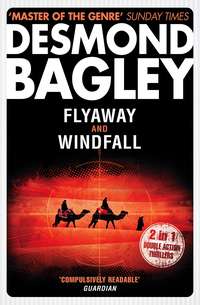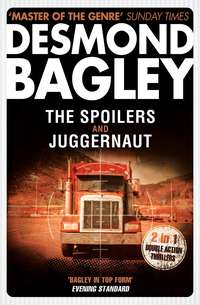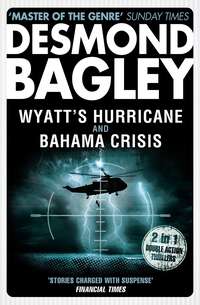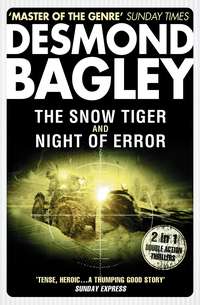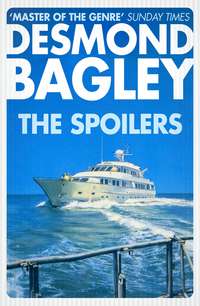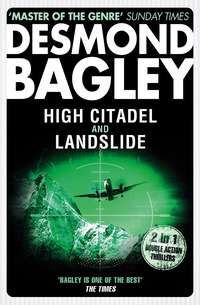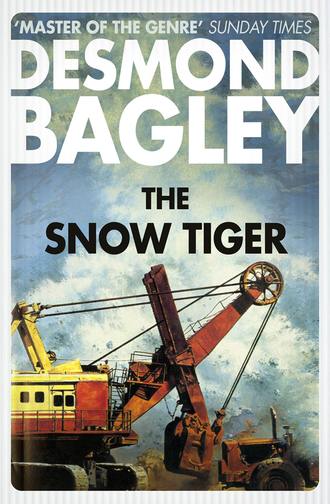
Полная версия
The Snow Tiger
‘You’ve got yourself a packet of trouble,’ said McGill.
Ballard snorted. ‘You don’t know the half of it. I haven’t said anything about the unions yet, not to mention the attitude of some of the town people.’
‘You sound as though you earn your pay. But why the hell stick to a Ballard company if you feel like this?’
‘Oh, I don’t know – some remnants of family loyalty, I suppose,’ said Ballard tiredly. ‘After all, my grandfather did pay for my education, and quite extensive it was. I suppose I owe him something for that.’
McGill noted Ballard’s evident depression and tiredness and decided to change the subject. ‘Let’s eat, and I’ll tell you about the ice worms in Alaska.’ He plunged into an improbable story.
FOUR
The next morning was bright and sunny and the snow, which had been falling all night, had stopped, leaving the world freshly minted. When Ballard got up, heavy-eyed and unrested, he found Mrs Evans in the kitchen cooking breakfast. She scolded him. ‘You should have let me know when you were coming back. I only learned by chance from Betty Hargreaves last night.’
‘I’m sorry,’ he said. ‘I forgot. Are you cooking for three?’ Mrs Evans usually ate breakfast with him; it was a democratic society.
‘I am. Your friend has gone out already, but he’ll be back for a late breakfast.’
Ballard consulted his watch to discover that he had overslept by more than an hour. ‘Give me ten minutes.’
When he had showered and dressed he felt better and found McGill in the living-room unwrapping a large parcel. ‘It came,’ said McGill. ‘Your truck got through.’
Ballard looked at what was revealed; it was a backpack which appeared to contain nothing but sections of aluminium tubing each nestling in an individual canvas pocket. ‘What’s that?’
‘The tools of my trade,’ said McGill. Mrs Evans called, and he added, ‘Let’s eat; I’m hungry.’
Ballard toyed with his breakfast while McGill wolfed down a plateful of bacon and eggs, and pleased Mrs Evans by asking for more. While she was out of the room he said, ‘You asked me here for the skiing, and there’s no time like the present. How’s your leg?’
Ballard shook his head. ‘The leg is all right, but sorry, Mike – not today. I’m a working man.’
‘You’d better come.’ Something in McGill’s tone made Ballard look at him sharply. McGill’s face was serious. ‘You’d better come and see what I’m doing. I want an independent witness.’
‘A witness to what?’
‘To whatever it is I find.’
‘And what will that be?’
‘How do I know until I find it?’ He stared at Ballard. ‘I’m serious, Ian. You know what my job is. I’m going to make a professional investigation. You’re the boss man of the mine and you couldn’t make a better witness. You’ve got authority.’
‘For God’s sake!’ said Ballard. ‘Authority to do what?’
‘To close down the mine if need be, but that depends on what I find, and I won’t know that until I look, will I?’ As Ballard’s jaw dropped McGill said, ‘I couldn’t believe my eyes at what I saw yesterday. It looked like a recipe for instant disaster, and I spent a damned uneasy night. I won’t be happy until I take a look.’
‘Where?’
McGill got to his feet and walked to the window. ‘Come here.’ He pointed at the steep slope above the mine. ‘Up there.’
Ballard looked at the long curve, blinding white in the sunlight. ‘You think …’ His voice tailed away.
‘I think nothing until I get evidence one way or the other,’ said McGill sharply. ‘I’m a scientist, not a soothsayer.’ He shook his head warningly as Mrs Evans came in with a fresh plate of bacon and eggs. ‘Finish your breakfast.’
As they sat down he said, ‘I suppose you can find me a pair of skis.’
Ballard nodded, his mind busy with the implications of what McGill had said – or had not said. McGill dug into his second plateful of breakfast. ‘Then we go skiing,’ he said lightly.
Two hours later they were nearly three thousand feet above the mine and half way up the slope. They had not talked much and when Ballard had tried McGill advised him to save his breath for climbing. But now they stopped and McGill unslung the backpack, dropping one of the straps over a ski-stick rammed firmly into the snow.
He took off his skis and stuck them vertically into the snow up-slope of where he was standing. ‘Another safety measure,’ he said conversationally. ‘If there’s a slide then the skis will tell someone that we’ve been swept away. And that’s why you don’t take off your Oertel cord.’
Ballard leaned on his sticks. ‘The last time you talked about avalanches I was in one.’
McGill grinned. ‘Don’t fool yourself. You were in a little trickle – a mere hundred feet.’ He pointed down the mountainside. ‘If this lot goes it’ll be quite different.’
Ballard felt uneasy. ‘You’re not really expecting an avalanche?’
McGill shook his head. ‘Not right now.’ He bent down to the backpack. ‘I’m going to do a little gentle thumping and you can help me to do it. Take off your skis.’
He began to take aluminium tubing from the pack and to assemble it into some kind of a gadget. ‘This is a penetrometer – an updating of the Haefeli design. It’s a sort of pocket pile-driver – it measures the resistance of the snow. It also gives us a core, and temperature readings at ten-centimetre intervals. All the data for a snow profile.’
Ballard helped him set it up although he suspected that McGill could have done the job just as handily without him. There was a sliding weight which dropped down a narrow rod a known distance before hitting the top of the aluminium tube and thus driving it into the snow. Each time the weight dropped McGill noted the distance of penetration and recorded it in a notebook.
They thumped with the weight, adding lengths of tubing as necessary, and hit bottom at 158 centimetres – about five feet.
‘There’s a bit of a hard layer somewhere in the middle,’ said McGill, taking an electric plug from the pack. He made a connection in the top of the tubing and plugged the other end into a box with a dial on it. ‘Make a note of these temperatures; there’ll be fifteen readings.’
As Ballard took the last reading he said, ‘How do we get it out?’
‘We have a tripod and a miniature block and tackle.’ McGill grinned. ‘I think they pinched this bit from an oil rig.’
He erected the tripod and started to haul out the tube. As the first section came free he disconnected it carefully and then took a knife and sliced through the ice in the tube. The sections were two feet long and the three of them were soon out. McGill put the tubes back into the pack, complete with the snow cores they contained. ‘We’ll have a look at those back at the house.’
Ballard squatted on his heels and looked across the valley. ‘What now?’
‘Now we do another, and another, and another, and another in a line diagonally down the slope. I’d like to do more but that’s all the core tubing I have.’
They had just finished the fourth trial boring when McGill looked up the slope. ‘We have company.’
Ballard turned his head to see three skiers traversing down towards them. The leader was moving fast and came around in a flashy stem christiania which sent the snow spraying before he stopped. When he lifted blue-tinted goggles Ballard recognized Charlie Peterson.
Peterson looked at Ballard with some astonishment. ‘Oh, it’s you! Eric told me you were back but I haven’t seen you around.’
‘Hello, Charlie.’
The two other skiers came up and stopped more sedately – they were the two Americans, Miller and Newman. Charlie said, ‘How did you get here?’
Ballard and McGill looked at each other, and Ballard wordlessly pointed to the skis. Charlie snorted. ‘You used to be afraid of falling off anything steeper than a billiard table.’ He looked curiously at the dismantled penetrometer. ‘What are you doing?’
McGill answered. ‘Looking at snow.’
Charlie pointed a stick. ‘What’s that thing?’
‘A gadget for testing snow strength.’
Charlie grinned at Ballard. ‘Since when did you become interested in snow? Your Ma wouldn’t let you out in it for fear you’d catch cold.’
Ballard said evenly, ‘I’ve become interested in a lot of things since then, Charlie.’
He laughed loudly. ‘Yes? I’ll bet you’re a hot one with the girls.’
Newman said abruptly, ‘Let’s go.’
‘No, wait a minute,’ said Charlie. ‘I’m interested. What are you doing with that watchamacallit?’
McGill straightened. ‘I’m testing the stresses on this snow slope.’
‘This slope’s all right.’
‘When did you have this much snow before?’
‘There’s always snow in the winter.’
‘Not this much.’
Charlie looked at Miller and Newman and grinned at them. ‘All the better – it makes for good skiing.’ He rubbed the side of his jaw. ‘Why come here to look at snow?’
McGill bent down to buckle a strap. ‘The usual reason.’
The grin left Charlie’s face. ‘What reason?’ he asked blankly.
‘Because it’s here,’ said McGill patiently.
‘Funny!’ said Charlie. ‘Very funny! How long are you going to be here?’
‘For as long as it takes.’
‘That’s no kind of answer.’
Ballard stepped forward. ‘That’s all the answer you’re going to get, Charlie.’
Charlie grinned genially. ‘Staying away for so long has made you bloody prickly. I don’t remember you giving back-chat before.’
Ballard smiled. ‘Maybe I’ve changed, Charlie.’
‘I don’t think so,’ he said deliberately. ‘People like you never change.’
‘You’re welcome to find out any time you like.’
Newman said, ‘Cut it out, Charlie. I don’t know what you have against this guy and I don’t much care. All I know is he helped us yesterday. Anyway, this is no place to pick a fight.’
‘I agree,’ said Ballard.
Charlie turned to Newman. ‘Hear that? He hasn’t changed.’ He swung around and pointed down the slope. ‘All right. We go down in traverses – that way first. This is a good slope for practising stem turns.’
Miller said, ‘It looks good.’
‘Wait a minute,’ said McGill sharply. ‘I wouldn’t do that.’
Charlie turned his head. ‘And why not, for Christ’s sake?’
‘It could be dangerous.’
‘Crossing the road can be dangerous,’ he said contemptuously. He jerked his head at Miller. ‘Let’s go.’
Miller pulled down his goggles. ‘Sure.’
‘Hold on,’ said Newman. He looked down at the penetrometer. ‘Maybe the guy’s got something there.’
‘The hell with him,’ said Charlie, and pushed off. Miller followed without another word. Newman looked at Ballard for a moment, then shrugged expressively before he followed them.
McGill and Ballard watched them go down. Charlie, in the lead, skied showily with a lot of unnecessary flair; Miller was sloppy and Newman neat and economical in his movements. They watched them all the way to the bottom.
Nothing happened.
‘Who’s the jerk?’ McGill asked.
‘Charlie Peterson. He’s set up as a ski instructor.’
‘He seems to know you.’ McGill glanced sideways. ‘And your family.’
‘Yes,’ said Ballard expressionlessly.
‘I keep forgetting you were brought up here.’ McGill scratched his cheek reflectively. ‘You know, you could be useful. I want to find someone in the valley who has lived here a long time, whose family has lived here a long time. I need information.’
Ballard thought for a moment and then smiled and pointed with his ski-stick. ‘See that rock down there? That’s Kamakamaru, and a man called Turi Buck lives in a house just on the other side. I should have seen him before now but I’ve been too bloody busy.’
McGill hung his backpack on a convenient post outside Turi Buck’s house. ‘Better not take that inside. The ice would melt.’
Ballard knocked on the door which was opened by a girl of about fourteen, a Maori girl with a cheerful smile. ‘I’m looking for Turi Buck.’
‘Wait a minute,’ she said and disappeared, and he heard her voice raised. ‘Grandpa, there’s someone to see you.’
Presently Turi appeared. Ballard was a little shocked at what he saw; Turi’s hair was a frizzled grey and his face was seamed and lined like a water-eroded hillside. There was no recognition in his brown eyes as he said, ‘Anything I can do for you?’
‘Not a great deal, Turi,’ said Ballard. ‘Don’t you remember me?’
Turi stepped forward, coming out of the doorway and into the light. He frowned and said uncertainly, ‘I don’t …, my eyesight’s not as good as … Ian?’
‘Your eyesight is not so bad,’ said Ballard.
‘Ian!’ said Turi in delight. ‘I heard you were back – you should have come to see me sooner. I thought you had forgotten.’
‘Work, Turi; the work comes first – you taught me that. This is my friend, Mike McGill.’
Turi beamed at them. ‘Well, come in; come in.’
He led them into the house and into a room familiar to Ballard. Over the great fieldstone fireplace was the wapiti head with its great spread of antlers, and a wood fire burned beneath it. On the walls were the wood carvings inlaid with paua shell shimmering iridescently. The greenstone mere – the Maori war axe – was still there and, in pride of place, Turi’s whakapapa stick, his most prized possession, very intricately carved and which gave his ancestry.
Ballard looked around. ‘Nothing has changed.’
‘Not here,’ said Turi.
Ballard nodded towards the window. ‘A lot of change out there, though, I didn’t recognize the valley.’
Turi sighed. ‘Too much change – too quickly. But where have you been, Ian?’
‘A lot of places. All over the world.’
‘Sit down,’ said Turi. ‘Tell me about it.’
‘Tell me about yourself first. Did that beautiful young lady call you “Grandpa”?’
‘I am a grandfather five times now.’ Turi’s shoulders shook. ‘My sons are men and all married. Both my daughters are mothers.’
‘Tawhaki,’ said Ballard. ‘How is Tawhaki?’ He had been Ballard’s playmate as a child and a constant companion as he grew older.
‘He does well,’ said Turi. ‘He went to the University of Otago and took a good degree.’
‘In what?’
Turi laughed. ‘In economics. Imagine a Maori knowing about economics. He has a post in the Department of Finance in Auckland. I don’t see him often.’
‘You must give me his address. I’ll look him up when next I’m in Auckland.’ Ballard saw Turi regarding McGill with interest. ‘Mike, here, is very interested in snow. He’s so interested he’s going to Antarctica later in the year.’
Turi’s seamed face broke into a grim smile. ‘Then there’s something for you here, Mike. We have a lot of snow; more than I can remember since 1943.’
‘So I’ve seen.’
Ballard went to the window. On the other side of the valley the cedar branches drooped heavily under the weight of snow. He turned, and said, ‘What happened to the trees on the west slope, Turi?’
‘Above the mine?’
‘Yes,’ said Ballard. ‘That slope has been stripped.’
McGill became alert. ‘The slope used to be timbered?’
Turi nodded and then shrugged. ‘When they put in the mine they wanted props. Kahikatea make good mine props.’ He looked up. ‘The Petersons own that land; they made a good profit.’
‘I bet they did,’ said Ballard.
‘Your mother shouldn’t have sold it to them.’ Turi clasped his hands. ‘Then they blasted out the stumps and put the land down to grass for hay. They run cattle on the river flats; Herefords for beef and a few dairy cows. That’s also become profitable now the town has grown.’
Ballard said, ‘Didn’t anybody think of what would happen when the snow came?’
‘Oh yes,’ said Turi. ‘I did.’
‘Didn’t you say anything? Didn’t you object when they put up the mine building? When they built the township?’
‘I objected. I objected very loudly. But the Petersons were louder. Who would listen to an old man?’ His lips twisted. ‘Especially one with a brown skin.’
Ballard snorted and looked at McGill who said slowly, ‘The stupid bastards! The stupid, greedy bastards!’ He looked about the room and then at Turi. ‘When did you come to the valley, Mr Buck?’
‘My name is Turi, and I was born here.’ He smiled. ‘New Year’s Day, 1900. I’m as old as the century.’
‘Who built the house?’
‘My father built it in about 1880, I think. It was built on the site of my grandfather’s house.’
‘And when was that built?’
Turi shrugged. ‘I don’t know. My people have lived here a long time.’
McGill nodded. ‘Did your father give any reason for building on the same site? Under this big rock?’
Turi answered obliquely. ‘He said that anyone building in Hukahoronui must take precautions.’
‘He knew what he was talking about.’ McGill turned to Ballard. ‘I’d like to test those samples pretty quickly. And I’d like to come back to talk to you, Turi, if I may?’
‘You must both come back. Come to supper and meet a couple of my grandchildren.’
As Turi accompanied them to the door Ballard said, ‘You don’t think much of the mine, do you, Turi?’
‘Too many changes,’ he said, and shook his head wryly. ‘We now have a supermarket.’
‘You know I’m in charge of the mine now – and I don’t like it much, either. But I think my reasons are different. You’re going to see more changes, Turi, but these I think you’ll like.’
Turi thumped him gently on the arm. ‘He tamariki koe? You’re a man now, Ian; a real man.’
‘Yes,’ said Ballard. ‘I’ve grown up. Thanks, Turi.’
Turi watched them put on their skis and, as they traversed the slope which led away from the house, he waved and called, ‘Haere ra!’
Ballard looked back over his shoulder. ‘Haere ra!’ They headed back to the mine.
FIVE
The late afternoon sun poured through the windows of the hall, rendered multi-coloured by the stained glass. Patches of colour lay across the tables; the carafe of water in front of Ballard looked as though it was filled with blood.
Dan Edwards loosened his tie and wished he could have a cold beer. ‘They’ll be adjourning pretty soon,’ he said to Dalwood. ‘I wish old Harrison would get a bloody move on. All this talk of snow doesn’t make me feel any cooler.’
Harrison poured himself a glass of water and sipped. He set down the glass, and said, ‘So you took samples of the snow cover on the western slope in the presence of Mr Ballard. What were your findings?’
McGill unzipped the leather satchel and took out a sheaf of papers. ‘I have written an entire report on the events that occurred at Hukahoronui – from the technical side, of course. I submit the report to the Commission.’ He gave the report to Reed who passed it up to Harrison. ‘Part One consists of my findings on the first series of snow profiles which was submitted to the mine management and, later, to the municipal authorities of Hukahoronui.’
Harrison flipped through the pages and frowned, then he passed the papers to Professor Rolandson. They conferred for a moment in low voices, then Harrison said, ‘This is all very well, Dr McGill; but your report appears to be highly technical and contains more mathematical formulae than the majority of us are accustomed to. After all, this is a public hearing. Could you not describe your findings in a language that can be understood by others apart from yourself and Professor Rolandson?’
‘Of course,’ said McGill. ‘Indeed, I did so to the people in Hukahoronui.’
‘You may proceed; and you may expect to be questioned – in the interests of clarity – by Professor Rolandson.’
McGill clasped his hands in front of him. ‘Snow is not so much a substance as a process; it changes in time. It begins with a snowflake falling to earth and becoming part of the general snow cover. It is a six-sided crystal and not very stable, and sublimation begins – a sort of evaporation. Eventually the crystal becomes a small, rounded granule. This is called destructive metamorphism and results in a higher density because the air is squeezed out. At the same time, because of the evaporative process, there is water vapour in the snow mass and, due to the low temperature, the separate granules tend to bond together by freezing.’
‘This bond is not particularly strong, is it?’ asked Rolandson.
‘The bond is not strong, when compared with other materials.’ Rolandson nodded and McGill went on. ‘The next thing to take into account is the temperature through the snow cover. It’s not constant – it’s warmer at the bottom than the top, thus forming a temperature gradient. If you look at Graph One you will find the temperature gradient of those first five samples.’
Rolandson flipped pages. ‘Not a very steep gradient – not more than two degrees.’
‘It’s enough for the next stage in the process. There is still a lot of air in the snow cover and the relatively warm air at the bottom begins to rise carrying water vapour with it. The vapour precipitates on the colder granules above. There is now a building process at work which is called constructive metamorphism, and a new kind of crystal begins to form – a cup crystal.’
‘Could you describe a cup crystal, Dr McGill?’
‘It’s a conical shape with a hollow in the blunt end – the cup.’
‘And how large is a cup crystal?’
‘A well-developed crystal may run to half an inch long, but you can take a quarter-inch as average.’ McGill paused, and when Rolandson remained silent, he said, ‘Graph Two shows the penetrometer readings – that is the resistance of the snow to stress.’
Rolandson studied it. ‘This is the resistance in kilograms plotted against depth?’
‘Yes, sir.’
‘There’s a discontinuity half way down on all five samples.’
‘Yes, sir; that’s a layer of surface hoar.’
Harrison interrupted. ‘If it is not on the surface how can it be described as surface hoar?’
‘It was on the surface. When the surface of the snow is colder than the air above it then there is more sublimation of water vapour – something like the condensation on the outside of a glass of cold beer.’ (In the Press gallery Dan Edwards sighed in anguish and licked his lips.) ‘In this case I should imagine it happened on a clear and cloudless night when there would be a lot of outgoing radiation. Then the hoar, or frost, would form on the surface producing flat plates of thin ice.’
Again Harrison brought up the objection. ‘But this discontinuity, as Professor Rolandson calls it, is not on the surface.’
‘No,’ agreed McGill. ‘Normally, when the sun hits it in the morning it disappears. In this case, I imagine that clouds came over before sunrise and it began to snow again quite heavily. The layer of hoar was covered and preserved.’
‘With what significance?’ queried Rolandson.
‘Several things could happen. The layer is quite hard, as you can see from the penetrometer readings. It is also quite smooth and could form a sliding surface for the snow above it.’ McGill extended two fingers. ‘Secondly, a layer of hoar is formed of flat plates of ice fused together – that is, it is relatively impermeable to air. This means that the most likely place for cup crystals to form would be just under the hoar layer.’
‘You emphasize cup crystals. In what way are they dangerous?’
‘They are dangerous because of their rounded shape and because there is very little bonding between one crystal and another.’ McGill tugged at his ear. ‘As a very rough analogy I would suggest that it would be very difficult for a man to walk on a floor loosely packed with billiard balls. It’s that kind of instability.’
‘Was there any evidence of cup crystals forming at this time?’
‘They had begun to form in sample one, the highest up the slope. I had reason to believe that the process would continue which would result in a marked decline in stability.’
‘Go on, Dr McGill.’
McGill put up a third finger. ‘Three, the weather forecast at the time indicated more snow – more weight – on that slope.’ He dropped his hand. ‘All things considered I came to the conclusion that the snow cover on the western slope of the valley of Hukahoronui was relatively unstable and thus formed a potential avalanche hazard. I so informed the mine management.’




